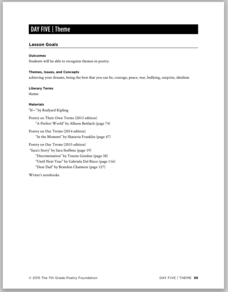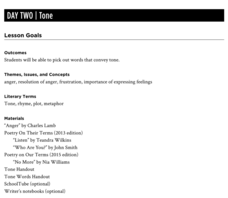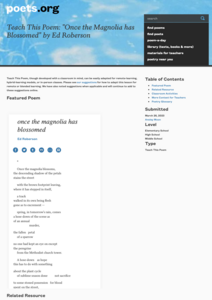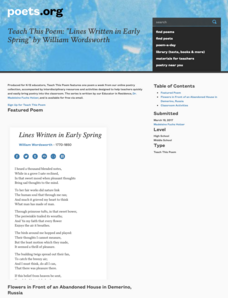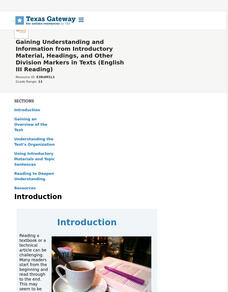Curated OER
Poems and Resources for the Struggling Writer
The 11th resource in a 12-part poetry unit is a bonus lesson comprised of poems, activities, and resources that review the essential concepts of the unit.
Curated OER
Ballad
Young balladeers analyze examples of ballads and generate a list of common traits (story, quatrains, rhyme schemes, refrains, etc.), then identify these traits in Robert W. Service's "The Cremation of Sam McGee" and a ballad written by...
Curated OER
Concrete Poems
Concrete poems, or shape poems as they are sometimes called, are the focus of the eighth lesson in this poetry unit. Young scholars examine several examples of concrete poems and consider how the shape contributes to the poem's meaning.
Curated OER
Personification
Spongebob Squarepants helps teach middle schoolers about personification! After discussing the human characteristics demonstrated by the cartoon character, scholars identify the personification in poems by Emily Dickinson and Langston...
Curated OER
Poetic Devices
Introduce middle schoolers to poetic devices with a lesson that asks them to find examples of alliteration, anaphora, onomatopoeia, metaphors, similes, and personification in various poems. Young scholars craft examples of these poetic...
Curated OER
Theme
A study of Rudyard Kipling's poem, "If," launches a lesson about theme. Class members read Kipling's poem and poems by other seventh graders to identify the themes.
Curated OER
Revision
Young poets learn the value of using a thesaurus when crafting and revising poems. They examine poems rich in figurative language and then a revised version with the figurative language removed. To demonstrate what they have learned,...
Curated OER
Tone
Identifying the tone in a piece of writing can be tricky. Readers don't have the advantage of studying the images and colors used in a painting or the instruments and sounds of a song. The second lesson in this poetry unit teaches tweens...
Curated OER
What Is Poetry?
The first lesson of 12 in a poetry unit asks class members to develop their own definition of poetry. After crafting a response, they examine a variety of examples and decide if the resources are or are not poems.
Academy of American Poets
Teach This Poem: "The Metier of Blossoming" by Denise Levertov
Poetry analysis need not be a lugubrious exercise for young learners. The approach used with Denise Levertov's poem, "The Metier of Blossoming" is one of close observation, of noticing and reflecting on the words, phrases, and images the...
Academy of American Poets
Teach This Poem: “Crisscross” by Arthur Sze
Arthur Sze's poem "Crisscross" launches a lesson that asks scholars to use their observation skills. They first draw an image that reflects what crisscross means to them. They then examine a photograph of a lightning strike and list what...
Academy of American Poets
Teach This Poem: "Instructions on Not Giving Up" by Ada Limón
What do the myth of the phoenix bird and Ada Limón's poem "Instructions on Not Giving Up" have in common? Young scholars create a list of what they notice about both the myth and poem, then consider what the similarities might indicate...
Academy of American Poets
Teach This Poem: "somewhere i have never travelled,gladly beyond" by E. E. Cummings
Scholars engage in a role-play exercise, compare their demonstration to a time-lapse video, and to a poem by E.E. Cummings. The ensuing discussion asks learners to consider the similarities among the three.
Academy of American Poets
Teach This Poem: "Once the Magnolia has Blossomed" by Ed Roberson
A free write, an image of magnolia leaves, and the Ed Roberson's poem "Once the Magnolia has Blossomed" ask scholars to use their noticing skills to reflect on the lesson beauty teaches about loss and grief.
Academy of American Poets
Teach This Poem: "Lines Written in Early Spring" by William Wordsworth
William Wordsworth's poem "Lines Written in Early Spring" lets learners sharpen their observation skills. Class members first closely examine the image "Flowers in Front of an Abandoned House in Demerino, Russia," listing what they...
Texas Education Agency (TEA)
Gaining Understanding and Information from Introductory Material, Headings, and Other Division Markers in Texts (English III Reading)
All teachers are teachers of reading! The 13-part interactive series ends with a lesson that teaches learners (and their instructors) how to approach reading their textbooks. After learning about several strategies, users test their...
Texas Education Agency (TEA)
Drawing Conclusions Based on the Sufficiency and Strength of Research (English III Reading)
High school juniors learn how to construct a strong argument by crafting a claim and using neutral language backed by evidence from reliable sources. To do so, they learn to evaluate sources and evidence to support claims. They then...
Texas Education Agency (TEA)
Evaluating the Effectiveness of Arguments, i.e., Identify Fallacies (English III Reading)
A series of interactive exercises provide users with the ammunition they need to detect logical fallacies and defend themselves against persuasion. Learners read about 11 types of logical fallacies and identify the type used in sample...
Texas Education Agency (TEA)
Distinguishing Between Inductive and Deductive Reasoning (English III Reading)
Is Sherlock Holmes an inductivist or a deductivist? Users of this interactive to distinguish between inductive and deductive reasoning. They consider in various situations whether it is better to list evidence and then introduce a claim...
Texas Education Agency (TEA)
Annotating to Deepen Understanding (English III Reading)
An interactive resource teaches readers how to annotate all kinds of texts. After reading an introduction that stresses the benefits of text annotations, users examine several models and then demonstrate what they have learned by...
Texas Education Agency (TEA)
Reference Guides (English III Reading)
An interactive resource introduces users to dictionaries, glossaries, and thesauri and the significant differences among these reference guides. Users learn which reference is best for which kind of search, examine sample entries from...
Texas Education Agency (TEA)
Simile and Metaphor (English III Reading)
The key idea in this interactive exercise designed for high schoolers is that figurative language, especially similes, and metaphors, add layers of meaning to a text. Users examine examples from speeches, ads, movie dialogue, and poems,...
Texas Education Agency (TEA)
Allusion (English II Reading)
The eighth lesson in a series of reading interactives focuses on allusions and what these literary devices add to a text. Readers examine examples of four types of allusions: mythological, religious, historical, and literary. They then...
Texas Education Agency (TEA)
Cognates (English III Reading)
Did you know that "30-40 percent of all words in English have a related word in Spanish?" This fact launches an interactive study of cognates appearing the same in English and Spanish. Learners demonstrate what they have learned about...







